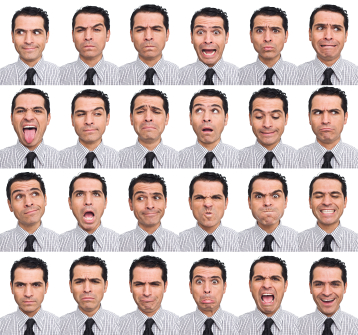


Are you having fun doing what you are doing? Too often folks associate “fun” with “lightweight” or "not earnest." We even throw around the word “serious” as if it is a compliment, as in, “She has a serious job.”
There are certainly times when humor and/or a lighthearted approach simply don’t feel appropriate, but my sense is that there are a lot of folks who are suffering from, well, a serious need of lightening up a bit. We need to make a habit of looking for more fun in our days—asking how we can “make it more fun,” or at least feel better in more life situations—especially at work. After all, are we more productive and of the most value to others when we are “grinding,” or when we are in in the midst of inspired action?
Certainly neuroscience supports this argument! In fact, this entry is an expansion on my comment responses to colleague, Jesse Lynn Stoner’s excellent post on rewiring your brain for leadership. Jesse’s advice includes guiding our thoughts toward the pleasant and the positive, especially during periods of high-demand on our personal resources.
This blog is focused on self-leadership, so let’s expand on our personal mental models of what is fun. My idea of fun includes inner life fun, and “inspired action” fun. A partial list…

Why All Choices are Emotional
Any belief we take on, or any logic we follow, we do so because on some level, we believe it will bring us closer to feeling better about ourselves and our reality, or it helps us defend against losing what level of comfort we already have.Read More...
Steve is a middle manager and a programmer who’s in his mid-thirties. He is in my Be Your Own Coach workshop, and I’ve asked him to write down his top ten “wants” in thirty-seconds.
Like most of the others in the workshop on this day, he doesn’t make it past three desires listed in the time allotted. I tell the workshop that this is evidence that not one of them is thinking about what they really want often enough, or they’d have successfully listed more than 10 desires each, given the same amount of time.
Steve agrees: “I realize that I haven’t thought about what I really wanted in years!” he reveals to the rest of the workshop.
I ask Steve to pick one of his desires from the list. He picks some training he wants his employer to provide him. I ask him why he wants it. He tells me that it will give him the certification he needs to get a promotion, and it will keep his skills current.
I ask Steve what that would mean to him. I ask him how that would make him feel. He disregards the feeling question, and answers logically (as I expect him to, because he is a Jungian “thinker&rdquo, “I am more likely to get a promotion and a raise with this training,” he says.
“How does that feel?” I persist.
“I would feel more confident leading my direct reports, and plus… well, I just realized something about my personality: I love to learn. I love knowledge! I’d feel great just learning new stuff!”
“So, if you had to sum it up” I continue, “How would this additional confidence, and the process of learning new stuff make you feel?”

Transforming Limiting Beliefs.
This last weekend, I facilitated a mini-workshop on transforming limiting beliefs at the ATMA center in West Hartford, Connecticut. Why was this workshop important? Why would anyone participate in such a workshop?
Imagine that you have a superpower that at the flip of a switch, allows you to change how you perceive yourself, others, and your life. Imagine that by using this power, you could improve work performance, enhance relationships, and enhance your health. That by using this extraordinary gift, you could unlock possibilities and potentials that were formerly hidden from you.
Well, that’s exactly how changing out a limiting belief can work. To see how your current beliefs are working for you, just look around. Your beliefs are operating around-the-clock, and they’re bringing you whatever is aligned with them… and not necessarily what you want.
Clearly, knowing how to recognize and transform limiting beliefs is a very real superpower.
But what is a belief? And what is a “limiting belief?”

Does your desire create enough spark to jump the gap from inspiration to action? Not all desire is created equal. There are weak desires and strong desires. Weak desires are more easily slowed or deflected by conflicting beliefs or short-term challenges. Strong desires will help us seek the alignment and focus we need to make the jump from dream to reality.
A strong desire is something that comes from your essential nature, and that is intimately connected with your individual preferences, abilities, and purpose. We’ll call this kind of strong desire “self-connected.”
Self-connected desires have a “why” that is motivated from the inside out.
A weak desire is something you do in order to comply with something outside you that you buy into just enough to recognize that it serves you at least SOME of the time. The inspiration for such a desire is also weak, because it is about complying to avoid creating a gap, and not about filling a gap you want to fill. If the inspiration is weak, so is the desire. (Please see the post before this one for an explanation of the relationship of inspiration to desire.)

There was a time in the early-80’s when, in spite of the three cups of coffee I’d consumed in less than an hour, I quite literally was having trouble keeping my eyes open sitting at my desk at the sales job I had—and this went on for weeks.
I thought I wanted out, but we already had a 15-month-old and Sue was pregnant with another, and my logical mind told me that the lucrative job I held was one I ought to keep—in spite of the fact that my body was telling me otherwise.
I was bored silly and felt trapped, but the desire to keep a relatively reliable income stream overrode the desire to try something new. Bringing another life into the house was a big enough change, and I didn’t want to introduce another.
But It’s no fun to do stuff you don’t buy into or like, and doing stuff that bores you or that you don’t like for too long—without some kind of coping strategy—can have negative effects on both psychological and physical wellbeing. It wasn’t long before my discomfort inspired the desire to seek new employment—the balance of desire had shifted.

Free Download, "Leadership as Connection" (Link at the End of this Post)
I’ve always thought that there was more to work than the work. We give our work meaning. Without the meaning we give to it, work seems like just “moving stuff around.” This is true whether that "stuff" is ideas or services or widgets or widget parts. When we get too serious about the moving stuff around part, and don’t balance that with the human-value part in the equation, well, work’s not as fulfilling or fun (and make no mistake, fulfillment and fun are big parts of employee engagement).
What’s love got to do with it? Love makes a leader a leader.
~Lucira Jane Nebelung


My self-leadership is self-authority—my power to author my life, from the inside out. It's my freedom to make choices that make sense to me, regardless of outside influence. This doesn't mean that I don't factor in consensus belief, or that I dismiss what others think. It does mean that when I'm on my game, the buck stops with me, and I like it that way.
How do we give our leadership away? Let us count the ways:

Since comparing ourselves to others is so often a happiness killer, and since comparing ourselves to others takes energy away from achieving our own desires, I am devoting this blog installment to this favorite past-time of overachievers, and the chronically unhappy—and most of the rest of us.
First, I’m going to call out comparison game, then provide an alternative approach for those of us who would like to dare not to compare, and enjoy ourselves and others free from this zero-sum distraction from true happiness.
